Key takeaways:
- Transitioning to eco-friendly laundry products, such as plant-based, biodegradable, or homemade detergents, can significantly reduce environmental impact and improve personal well-being.
- Implementing sustainable practices like line drying, washing full loads, and using energy-efficient appliances can lead to both water and energy conservation.
- Simple DIY solutions, like utilizing baking soda and vinegar, offer effective and natural alternatives for cleaner laundry while enhancing the overall laundry experience.
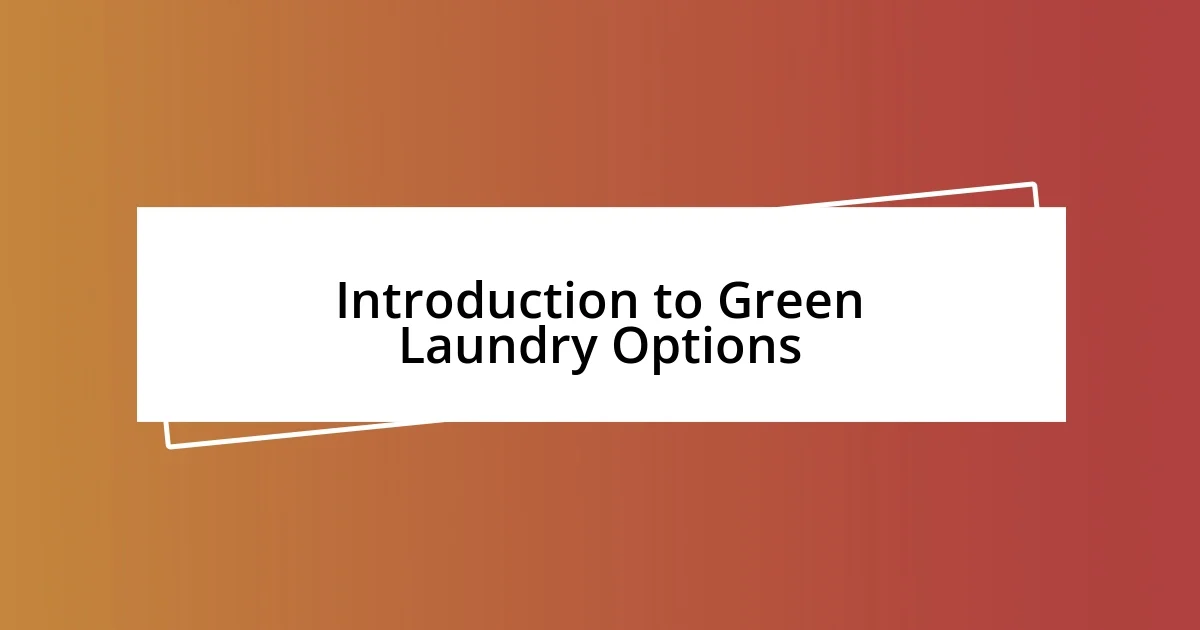
Introduction to Green Laundry Options
When I first delved into green laundry options, I was surprised by how simple yet impactful the changes could be. It’s often easy to overlook the environmental cost of our laundry habits, but when I started considering eco-friendly alternatives, it felt like a small but meaningful step towards sustainability. Have you ever stopped to think about how conventional detergents not only affect your clothes but also the planet?
Opting for eco-friendly products was initially a daunting task for me, filled with questions about effectiveness. However, experimenting with plant-based detergents and homemade solutions revealed not only a cleaner wardrobe but also a cleaner conscience. There’s something quite rewarding in knowing that my laundry routine now aligns with my values—it’s a win-win!
I never thought laundry could be a path to mindfulness, but incorporating greener options has transformed my laundry day into a reflection of my commitment to the environment. From using vinegar as a fabric softener to swapping plastic bottles for refillable containers, these small changes have added a sense of purpose to my routine. What simple shifts can you make today to green your own laundry?

Benefits of Eco-Friendly Laundry
One of the standout benefits of opting for eco-friendly laundry practices is the significant reduction in harmful chemicals entering our water systems. I remember the first time I used a plant-based detergent; it was like a breath of fresh air. Not only did my clothes feel cleaner, but I also felt relieved knowing I was contributing to a healthier ecosystem. Isn’t it incredible how a small switch can ripple out to affect our environment positively?
Here’s a quick run-down of the benefits:
- Reduced Chemical Exposure: Eco-friendly products minimize skin irritation and allergies for you and your family.
- Water Conservation: Many green laundry techniques require less water, helping to conserve this precious resource.
- Sustainable Sourcing: Plant-based detergents come from renewable resources, reducing dependence on finite fossil fuels.
- Energy Efficiency: Using cold water for laundry cuts down on energy consumption, which is great for both the planet and your utility bill.
- Support for Green Companies: Choosing eco-friendly products often means supporting businesses focused on sustainability, promoting a circular economy.
It’s meaningful to witness how these choices not only enhance my laundry routine but also align my values with my actions, making me feel more connected to the world around me. Each wash feels like a little victory for the planet, and I genuinely love that feeling.
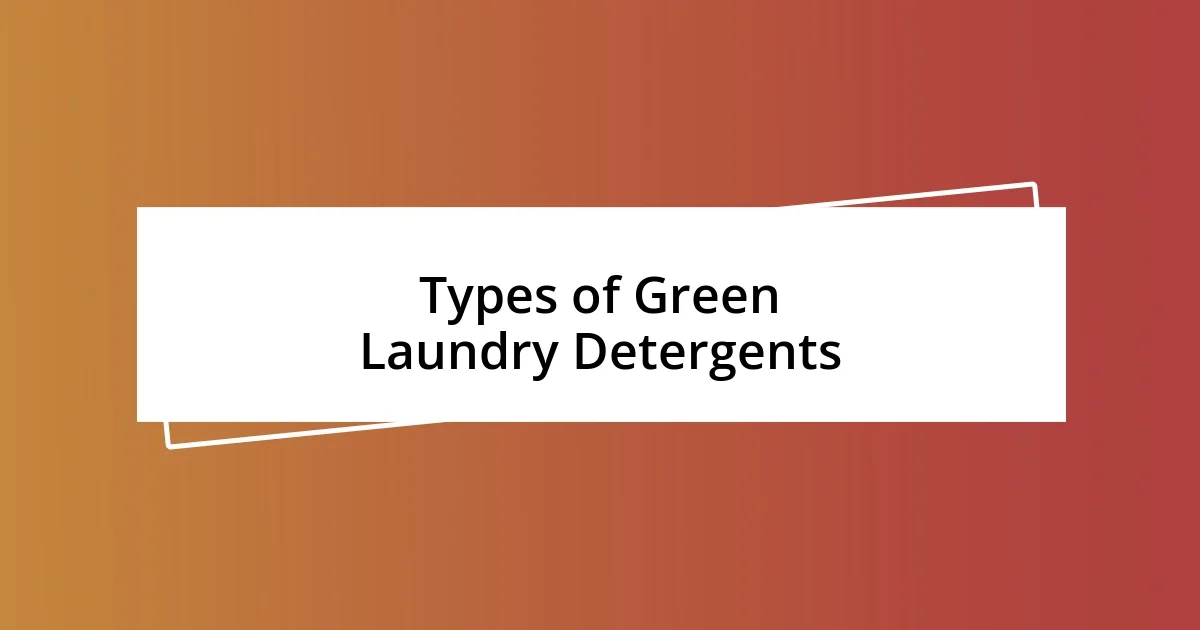
Types of Green Laundry Detergents
When exploring the types of green laundry detergents, I found that there are several options available, each with its unique benefits. For instance, I experimented with plant-based detergents, which use naturally derived ingredients instead of synthetic chemicals. I was pleasantly surprised by how effectively they cleaned my clothes while also providing peace of mind knowing they were gentler on the environment.
Another option worth considering is biodegradable detergents. These not only break down naturally but also leave behind fewer toxins in our ecosystem. I recall a time when I tried a biodegradable brand, and I was impressed with how fresh my laundry smelled without any harsh chemical fragrances that often cause allergies. It felt like I was contributing to the planet’s health with every load.
Lastly, there are homemade laundry detergents, which may seem like a daunting task at first, but I found the experience quite rewarding. Mixing ingredients like baking soda, soap flakes, and essential oils turned into a fun activity for me. The satisfaction of knowing exactly what’s in my detergent and that it’s eco-friendly gave me a sense of control and accomplishment that store-bought options simply couldn’t replicate.
| Type of Detergent | Key Characteristics |
|---|---|
| Plant-Based | Naturally derived, effective cleaning, non-toxic |
| Biodegradable | Breaks down naturally, fewer toxins, eco-friendly |
| Homemade | Customizable, transparent ingredients, cost-effective |
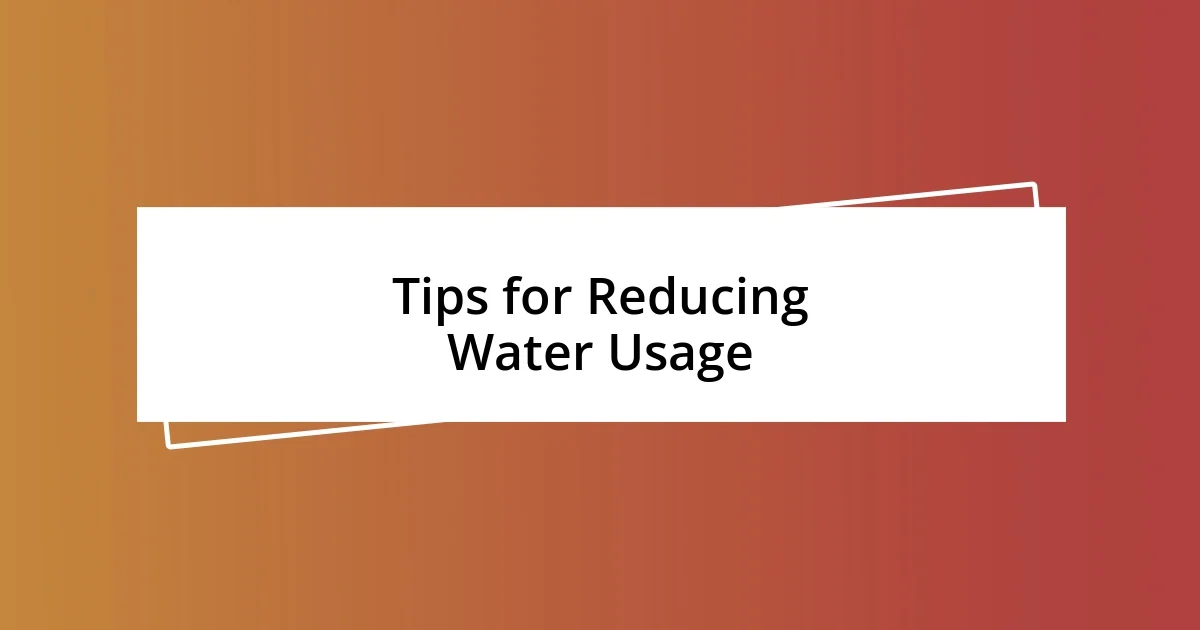
Tips for Reducing Water Usage
To reduce water usage during laundry, I’ve found it essential to always run a full load. It might seem tempting to wash just a few items, but each wash cycle uses the same amount of water, regardless of the load size. I often think about the cumulative impact of making this small adjustment – it’s like choosing to take a single trip to the store instead of multiple, which can really add up over time.
Another tip I’ve embraced is adjusting my washing machine settings. Many machines have options for water-saving cycles or allow you to choose the water level based on the size of your load. I remember the first time I experimented with these settings; not only did I save water, but the clothes turned out just as clean. It’s fascinating to see how technology can support our eco-friendly goals.
Lastly, I’ve started rinsing clothes in a bucket instead of using the washing machine’s rinse cycle. This not only reduces water use but also gives me a chance to reuse that rinse water for my plants. It feels rewarding to repurpose every drop and connects me to my garden in a meaningful way. Have you ever thought about how a little creativity with your laundry routine can lead to immense benefits for both your home and the environment? Every effort counts!
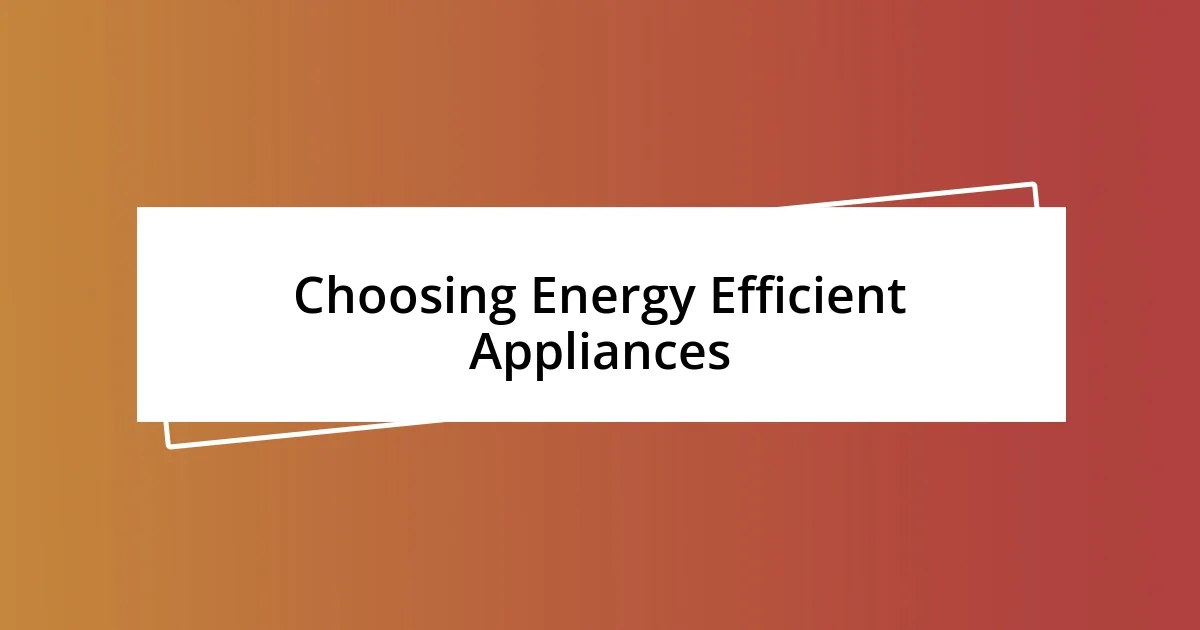
Choosing Energy Efficient Appliances
Choosing energy-efficient appliances can significantly influence our laundry routines and overall environmental impact. When I decided to upgrade my washing machine, I opted for an Energy Star certified model. The moment I saw my energy bill drop, I felt a sense of achievement as if I had made a tangible contribution to sustainability, proving that a simple appliance choice can lead to real savings and a lower carbon footprint.
I also learned that front-loading washers tend to use less water and energy compared to traditional top loaders. My first experience with a front-loader was eye-opening; they offered superior cleaning performance while using much less energy. It’s hard not to appreciate that I was saving resources without sacrificing quality. Have you experienced this kind of efficiency shift in your own life?
Refrigerators with energy-efficient labels often come equipped with features that help reduce energy consumption, like smart temperature controls and energy-saving modes. A few months ago, when I replaced my old fridge, I remember the excitement as I reveled in no longer worrying about its energy hogging. Knowing that I’m not just keeping my food fresh but also doing my part for the planet is a feeling that can’t be overstated. Choosing energy-efficient appliances isn’t just about reducing bills; it’s also a step towards a more sustainable lifestyle.

Sustainable Laundry Practices at Home
When I think about sustainable laundry practices, switching to eco-friendly detergents stands out as a major change for me. I once tried a brand that used plant-based ingredients, and I was pleasantly surprised by how clean my clothes felt without the harsh chemicals. It made me wonder, have you ever taken a moment to read the ingredient label on your detergent? Choosing products that are biodegradable not only helps reduce pollution but also aligns with a more natural lifestyle.
Another practice I’ve adopted is line drying my clothes whenever possible. The first time I hung my clothes outside, I was struck by the fresh scent that lingered. There’s something rewarding about seeing them sway in the gentle breeze while soaking up the sun—the natural way to dry. Plus, I noticed how this simple act helps extend the lifespan of my garments, reducing the need for replacements. Why not embrace the sun’s free energy instead of relying solely on the dryer?
Additionally, I keep a close eye on my laundry routine timing. I’ve opted to do my laundry during off-peak hours, which has not only saved me money but also lessened the strain on the energy grid. When I realized that my late-night washing was supporting a more sustainable energy model, I felt like I was part of a larger movement. Don’t you find it empowering to take small, intentional steps that collectively make a big difference? By making these choices, I see an opportunity in every wash cycle.
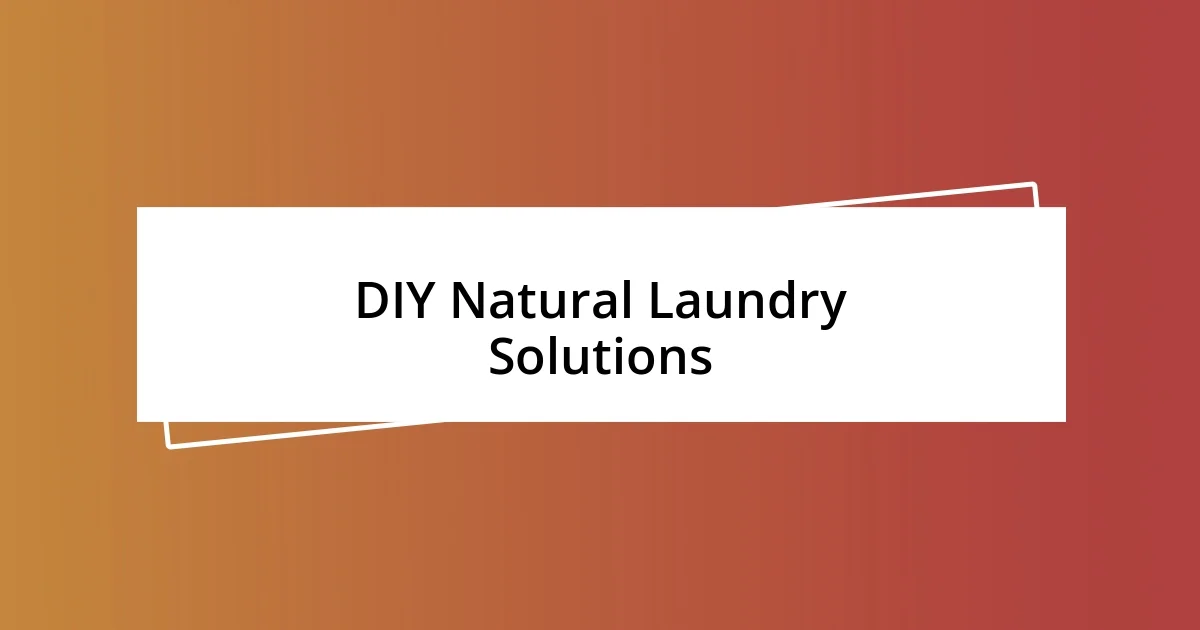
DIY Natural Laundry Solutions
One of my favorite DIY natural laundry solutions is making my own laundry detergent. I started experimenting with a simple recipe that includes washing soda, soap flakes, and essential oils. The first batch I made filled my home with a refreshing scent, and that moment of discovering how effective it was at cleaning my clothes was so satisfying. Have you ever tried creating something from scratch only to find it performs better than what you usually purchase?
Baking soda is another fantastic natural ingredient I’ve incorporated into my laundry routine. Not only does it act as a deodorizer, but it also boosts the cleaning power of my detergent. I remember one particular time when I used it to tackle a stubborn stain on my favorite shirt; seeing the stain vanish felt like a small victory. It’s incredible how a common household item can come to your rescue, don’t you think?
Lastly, I occasionally add white vinegar to my rinse cycle, and the results have been remarkable. At first, I was skeptical, but after trying it, I noticed my clothes felt softer and fresher than ever. The vinegar also helps to break down detergent residues, ensuring my fabrics breathe better. It’s a simple yet effective trick that makes laundry day a breeze. Have you ever considered how much versatility there is in ingredients you probably already have at home?














